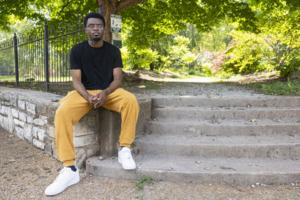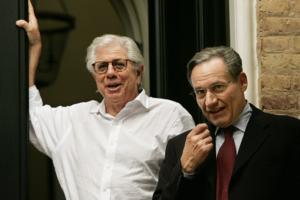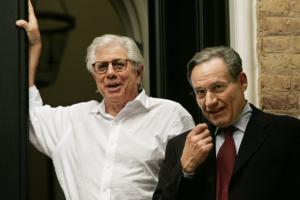Health
/ArcaMax

He was shot in St. Louis as a boy. He became a star college student and a role model
ST. LOUIS — Jordan Hughes strode to the lectern and looked around.
The eyes of hundreds of his fellow St. Louis Community College graduates were on him. He’d been practicing his valedictory address for weeks, but it still felt unreal.
“If you had told me five years ago that I could be the commencement speaker today, I probably would have...Read more

Heidi Stevens: When newsrooms shrink, so does our capacity to know and understand one another
In my son’s high school journalism class a few months ago, the teacher introduced them to “All The President’s Men,” the Oscar-winning film about Watergate, based on the explosive book by Bob Woodward and Carl Bernstein, the Washington Post reporters who took down President Richard Nixon and forever changed American history and ...Read more

Two babies' skulls found at museum linked to murder mystery from 1980
PHILADELPHIA -- On a Friday last November, staff at the Mütter Museum in Philadelphia were in the midst of conducting an audit of the medical history museum’s collection of some 6,600 human remains when they found a box in the library stacks of their Center City building.
The tag on it read, “Two mummified infant heads,” said Erin ...Read more

Sales tax holidays can save you money on back-to-school shopping -- or on new clothes or a laptop for yourself
Summer is winding down, and it’s almost time for back-to-school shopping. If your state offers a sales tax holiday — fewer than 20 states do this year — you might be able to give your wallet a bit of a break.
And that’s true whether or not you have children: These sales-tax holidays can be a good time to buy new clothes, a computer or ...Read more

Heidi Stevens: When newsrooms shrink, so does our capacity to know and understand one another
In my son’s high school journalism class a few months ago, the teacher introduced them to “All The President’s Men,” the Oscar-winning film about Watergate, based on the explosive book by Bob Woodward and Carl Bernstein, the Washington Post reporters who took down President Richard Nixon and forever changed American history and ...Read more

On Gardening: A new Maestro of the garden bringing bees, birds and butterflies
This is a wonderful time to be a gardener, particularly for those whose passions aren’t just blooms, but also bees, birds and butterflies. I say that because new agastache varieties are showing up in every plant company. Such is the case with Proven Winners new Maestro Coral and Maestro Gold.
These new varieties follow close on the heels of ...Read more

Ask Anna: My boyfriend's fitness comments are hurting my self-esteem
Dear Anna,
I've been dating my boyfriend for two months, and while he's incredibly kind and caring, I'm struggling with something that's making me feel insecure. He regularly makes comments like “we should go to the gym together” or “when are you going to start going to the gym?” He works out multiple times a week, follows fitness ...Read more

You're more likely to win Powerball 100 times than do what this California mom did
LOS ANGELES — An Apple Valley, California, mother just went 4 for 4 on her kids all being born on the date 7/7.
Just before Nauzhae Drake, now 26, delivered her firstborn, she called her mother while driving to school. She told her that she saw a license plate that ended in four sevens — her lucky number. Drake's mom took it as a sign.
"...Read more

Ask Dating Coach Erika: What if my match doesn't ask me any questions?
It happens all the time. You match with someone online. You ask a thoughtful question about their profile, and they respond… with no questions about you back. You try again with a question. They respond with no questions back. Now what?
I want to introduce a concept called 2QS, or Two Questions and a Statement.
Here’s how it works: Give ...Read more

A liberal Florida activist is packing up for Canada. Here's why
TAMPA, Fla. -- Beth Weinstein isn’t known for walking away from a battle.
The liberal activist from Tarpon Springs, Florida, regularly rallies against Republican politicians, taunts anti-abortion protesters and trolls online opponents of LGBTQ+ rights.
Raised in what she called a racist Long Island neighborhood by a mom who taught her to be ...Read more

The Kid Whisperer: How to set and enforce calm limits with your kids
Dear Kid Whisperer,
My two sisters and I were on a vacation with our combined six kids, ages 3-11. By the time we got to the airport to fly home, they basically all stopped listening to us. I tried to take control at the gate in the airport before our flight and loudly told them that they were not allowed to sit next to each other while they ...Read more

Holding tight one paper clip at a time
The man of the house is tall, lean and so bald that his head shines almost as much as his smile. He worked law enforcement all his career. As a state trooper, he once rescued the Beatles from crazed fans after a St. Louis concert.
He worked for the federal government as well, something to do with organized crime and exploding body parts. I don�...Read more

Survey: Nearly 1 in 2 workers plan to search for a new job in the coming year
After several years of favorable conditions for workers, with many job-hopping for better pay and benefits, the economy is once again an employer’s market. Despite that, nearly half (48%) of those working full-time or looking for full-time employment say they’re likely to search for a new job in the next 12 months, according to Bankrate’s ...Read more

Ex-etiquette: The police have bigger problems than your parenting disagreements
Q. My ex has always tried to manage me. It has always been a problem and led to our breakup. I want to take our two adolescent sons, ages 10 and almost 12, zip lining next weekend. They are very excited. She said it was too dangerous, and she threatened to call the police if I tried to take them. I can do what I want when the kids are with me, ...Read more

Survey: Inflation less impactful this year; still, nearly 1 in 3 back-to-school shoppers are making changes to save
When it comes to back-to-school shopping, some of us might think fondly of new backpacks and the scent of fresh pencils. But Bankrate’s 2025 Back-to-School Shopping Survey shows others might simply see dollar signs.
Stubborn inflation continues to change how nearly 1 in 3 back-to-school shoppers (30%) shop, but that percentage has trended ...Read more

Rare purple sea creature found on SoCal beach. Could warming waters be why?
LOS ANGELES -- Oceanographer Anya Stajner was recently enjoying a sunset walk along the La Jolla Shores beach when a vibrant violet pop of color caught her eye in the sand.
She got down on her hands and knees and was astonished to realize she had stumbled upon a rare species of sea snail, Janthina janthina.
These creatures, more commonly ...Read more

Heidi Stevens: As our land literally burns, we don't owe the president quiet subservience
On July 23 — three weeks into a month that saw close to 100 million Americans living under heat alerts, 17 million people living under flash flood warnings and Oregon’s massive Cram Fire barreling toward its 100,000th acre burned — the United Nations' highest court declared climate change an “urgent and existential threat.”
"The human...Read more

On Gardening: Pink Cloud will make its debut in 2026
There will be a cloud hanging over the Supertunia Mini Vista Petunia group next year, but I promise you will jump for joy.
It will be even more cloudy if you plant the new Supertunia Mini Vista Pink Cloud petunia in hanging baskets. But those of us provided with the opportunity to trial them this year are finding they are perfect for window ...Read more

This vibrant Fijian community relies on faith, food and family ties
SACRAMENTO, Calif. -- Joseph O’Connor, pastor of the Sacramento Fijian Seventh-day Adventist Church, doesn’t mind that his congregation meets in a rented space off Arden Way.
On Saturdays, the church is one of many spaces where Sacramento’s Fijian community explores fellowship, food and faith within California’s capital city. Sacramento...Read more

Summer school for migrant students takes a double hit from Trump. Fewer kids go to the zoo
LOS ANGELES — The 8-year-old girl is a migrant student whose family moves frequently in search of seasonal work. But for five weeks this summer, she found stability, fun and academic nurturing in a program for children like her that included visits to the L.A. Zoo twice a week.
But like the axolotl, the salamander she studied, this program is...Read more
Popular Stories
- A liberal Florida activist is packing up for Canada. Here's why
- Survey: Nearly 1 in 2 workers plan to search for a new job in the coming year
- Holding tight one paper clip at a time
- Heidi Stevens: When newsrooms shrink, so does our capacity to know and understand one another
- Two babies' skulls found at museum linked to murder mystery from 1980






















